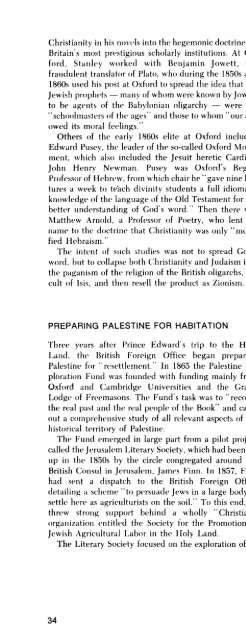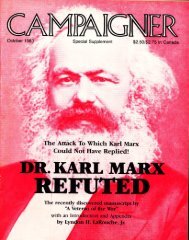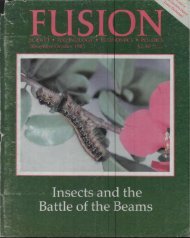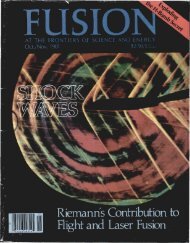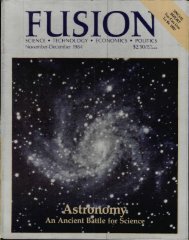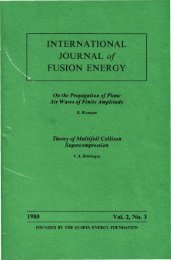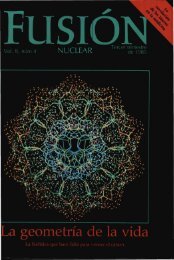Create successful ePaper yourself
Turn your PDF publications into a flip-book with our unique Google optimized e-Paper software.
Christianity in his novels into the hegemonic doctrines of<br />
Britain's most prestigious scholarly institutions. At Oxford,<br />
Stanley worked with Benjamin Jowett, the<br />
fraudulent translator of Plato, who during the 1850s and<br />
1860s used his post at Oxford to spread the idea that the<br />
Jewish prophets — many of whom were known by Jowett<br />
to be agents of the Babylonian oligarchy — were the<br />
"schoolmasters of the ages'' and those to whom "our age<br />
owed its moral feelings."<br />
Others of the early 1860s elite at Oxford included<br />
Edward Pusey, the leader of the so-called Oxford Movement,<br />
which also included the Jesuit heretic Cardinal<br />
John Henry Newman. Pusey was Oxford's Regius<br />
Professor of Hebrew, from which chair he "gave nine lectures<br />
a week to teach divinity students a full idiomatic<br />
knowledge of the language of the Old Testament for the<br />
better understanding of God's word." <strong>The</strong>n there was<br />
Matthew Arnold, a Professor of Poetry, who lent his<br />
name to the doctrine that Christianity was only "modified<br />
Hebraism."<br />
<strong>The</strong> intent of such studies was not to spread God's<br />
word, but to collapse both Christianity and Judaism into<br />
the paganism of the religion of the British oligarchs, the<br />
cult of Isis, and then resell the product as Zionism.<br />
PREPARING PALESTINE FOR HABITATION<br />
Three years after Prince Edward's trip to the Holy<br />
Land, the British Foreign Office began preparing<br />
Palestine for "resettlement." In 1865 the Palestine Exploration<br />
Fund was founded with funding mainly from<br />
Oxford and Cambridge Universities and the Grand<br />
Lodge of Freemasons. <strong>The</strong> Fund's task was to "recover<br />
the real past and the real people of the Book" and carry<br />
out a comprehensive study of all relevant aspects of the<br />
historical territory of Palestine.<br />
<strong>The</strong> Fund emerged in large part from a pilot project<br />
called the Jerusalem Literary Society, which had been set<br />
up in the 1850s by the circle congregated around the<br />
British Consul in Jerusalem, James Finn. In 1857, Finn<br />
had sent a dispatch to the British Foreign Office<br />
detailing a scheme "to persuade Jews in a large body to<br />
settle here as agriculturists on the soil.'' To this end, he<br />
threw strong support behind a wholly "Christian"<br />
organization entitled the Society for the Promotion of<br />
Jewish Agricultural Labor in the Holy Land.<br />
<strong>The</strong> Literary Society focused on the exploration of all<br />
sorts of "antiquities'' and ran various archaeological digs.<br />
It attracted scores of potential cult recruits and was<br />
patronized by the Archbishop of Canterbury.<br />
From 1865-76, the Palestine Exploration Fund was<br />
the clearinghouse for Anglican Restoration-to-Palestine<br />
propaganda:<br />
•<strong>The</strong> Fund worked with the British War Office to<br />
organize studies that would document the "inhabit¬<br />
ability" of Palestine by demonstrating its "inhabit¬<br />
ability" in the past and its current available resources.<br />
<strong>The</strong> head of these expeditions was Sir Charles Warren,<br />
who concluded in a work published in 1875 that<br />
Palestine "could again be the productive land it had<br />
been of old.'' Warren proposed that Palestine be<br />
developed by the East India Company with "the avowed<br />
intention of gradually introducing the Jews pure and<br />
simple (!) who would eventually occupy and govern the<br />
country" — a country which would achieve "a population<br />
of fifteen million."<br />
•A parallel study was conducted by Lieutenants<br />
Claude Conder and (the future Lord) Kitchener. <strong>The</strong><br />
later author of such works as Judas Maccabeus and the<br />
Jewish War of Independence and <strong>The</strong> Hebrew Tragedy,<br />
Conder and the Palestine Exploration Fund laid out a<br />
comprehensive plan to make Palestine "habitable again"<br />
as it was before the Arab conquest had driven out the<br />
Byzantines. In 1882, Conder was chosen to guide another<br />
crown tour of the Holy Land, this time by the future<br />
George V, then Prince George.<br />
•<strong>The</strong> now-decrepit Lord Shaftesbury, one of the<br />
Fund's founders, became its president in 1875. As he was<br />
preparing to die with dignity, Shaftesbury pleaded for<br />
the Fund "to send out the best agents" to "prepare"<br />
Palestine "for the return of its ancient possessors...for<br />
the time cannot be far off before that great event will<br />
come to pass." <strong>The</strong>n, right before doddering to his grave,<br />
Shaftesbury wrote in the Quarterly Review:<br />
Syria and Palestine will ere long become most important.<br />
<strong>The</strong> old time will come back...the country<br />
wants capital and population. <strong>The</strong> Jew can give it<br />
both. And has not England a special interest in<br />
promoting such a restoration?...She must preserve<br />
Syria to herself. Does not policy then...exhort<br />
England to foster the nationality of the Jews and<br />
aid them, as opportunity may offer, to return as a<br />
leavening power to their old country? England is<br />
the great trading and maritime power of the world.<br />
To England, then, naturally belongs the role of<br />
favouring the settlement of the Jews in<br />
Palestine....<strong>The</strong> nationality of the Jew exists, the<br />
34


